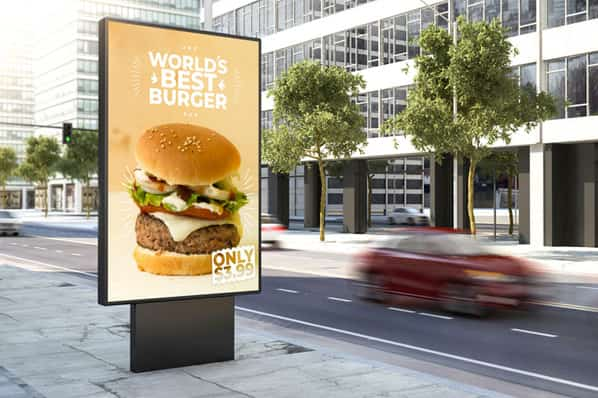We're still asking ourselves that question. Beyond this edge case, many brands exemplify how businesses should approach personalized marketing.
In this post, you’ll learn how personalized marketing works and see examples of brands that practice it without sounding creepy. Here are 14 brands that nailed personalized marketing in a fun, non-intrusive way.
14 Personalized Marketing Examples
1. Shutterfly
Shutterfly is a website and app for creating canvases, photo books, and calendars. It’s also great for designing personalized gifts with the faces of people or anything you want.
One of Shutterfly’s hallmarks is the creative emails it sends. But more than that is the personalized item offerings on its app.
If you download the Shutterfly smartphone app, you can create an account and permit Shutterfly to access your photos.
With this permission, Shutterfly automatically identifies photos with faces and places them on items you can purchase from the app. An example is these mugs.

The Takeaway
If you sell personalized products, it’s helpful to show your customers what they could get. Seeing their photos or words related to their life on your product could entice them to buy.
However, when you do this, ensure you get explicit permission to go through someone’s information to pull this data. Without proper permissions, getting the personal data of customers could come off as untrustworthy or downright creepy.
2. Funko
Personalization can be a value proposition and generate buzz around your brand. Looking for an example? Check out Funko, a toy manufacturer best known for its bobblehead-like figures of pop cultural icons.
In 2023, the brand launched a new POP! Yourself line, where customers can make Funko figures of themselves, their families, and their friends. This allows customers to interact with the brand, creating something in their image.

The Takeaway
Personalization gives your audience a unique way to interact with your brand. Funko figures have a cult following among collectors.
This new offering allows brand enthusiasts to create something totally unique — a figure they can’t get anywhere else.
Folks who know Funko lovers can also create a gift that their loved one doesn’t have in their collection.
3. Penguin Random House
Personalized marketing isn’t just about making custom products. Often, personalized marketing focuses on pairing your current products with folks who will love them.
For example, let’s take a look at book publisher Penguin Random House.
The publishing company has a wide range of titles, and book lovers can find something they’ll love in their library. The marketing team at the company makes the process a little easier with quizzes.
Readers can find out who their literary match might be, piquing their interest in buying the book.

The Takeaway
Quizzes are both a sneaky way to offer recommendations and an interactive element that can keep your website visitors entertained. You can provide an easy, fun way to personalize their experience on your site.
4. Vidyard
I was in awe when my colleague, HubSpot Academy Sales Professor Kyle Jepsen, forwarded me an email with the comment, “Taking personalization to a whole new level.” This video shows personalized marketing at its finest.
Vidyard could have superimposed each recipient’s name onto the whiteboard in this video and kept the same script for each one.
But they didn’t stop there. Cole, the gentleman speaking in the video, not only addressed Kyle by his first name but also referred to his specific colleagues and the conversations he had with them.
The Takeaway
There’s only so much personalization you can achieve using text. But personalized videos? That changes everything. Personalizing your mixed media content is an interesting and often effective approach. “I mean, clearly, he made the video just for me,” Jepson said.
While this sort of data-driven personalization is memorable, it’s also extremely time-consuming. So, if you set out to create it, be absolutely sure you’re targeting the right people. There’s nothing worse than taking the time to produce something highly customized, only to discover you’ve sent it to someone who doesn’t have the decision-making power you need.
5. Tony Robbins & Dean Graziosi
Self-improvement experts Tony Robbins and Dean Graziosi hosted a week-long Own Your Future webinar in 2021. After the webinar, registered participants received a personalized appreciation email. This email included a picture of Dean holding an envelope with each participant's first name handwritten on it.
Damilare Olasinde, a content marketing professional, was one of the webinar attendees. He had this to say about how he felt upon receiving the email.
“It thrilled me to bits. Being a copywriter, I’m familiar with email personalization. But I’d never seen this before, and I loved it.”
The Takeaway
Email personalization typically revolves around custom subject lines, list segmentation, and personalized content. But Tony and Dean took their email personalization efforts up a notch.
This might feel like a cheap thrill, but it makes a difference to customers. For instance, Damilare knew that this seemingly handwritten address was probably a handwritten font generated by software. Still, the gesture warmed his heart.
As an entity, you need to find creative ways to use digital tools or hire a full-service marketing agency to create cute little moments like what Tony and Dean’s list members experienced. This kind of gesture is difficult to forget, even after many years. It can help you create loyal fans and customers for a lifetime.
6. IPSY
IPSY is another brand with personalization at the core of its business. This subscription service sends over five personalized, sample-sized products every month to its users. The grab bag’s selection is based on the product categories users are most interested in.
To get started, subscribers take a quiz to indicate their interests. Here, they can indicate what products they would like to receive and how frequently.

The Takeaway
Beauty is a very personal category. Shoppers are looking for products that match their skin tone and shade range. The more personalized your product offering, the more personalized your marketing should be.
7. Amazon
Amazon’s personalization efforts aren’t exactly new. Since at least 2013, its product curation and recommendation algorithm has made headlines and case studies. And yet, every time I visit my Amazon homepage, I can’t help but scroll down and get a kick out of its recommendations for me. Have a look:

Those who know me are aware of my borderline obsession with hip-hop, which is also the motivation for much of my online shopping behavior. Clearly, Amazon has taken notice.
And as I continued scrolling down, the fitting personalization went on. There was a header reading “For a night in” with recommendations on what to stream on Amazon Prime — an activity that comprises most of my weekend.
Its recommendations for dog and kitchen products were on point, as well. After all, those are the categories where I make the most purchases.
It’s not just me. When I asked my colleagues what their Amazon homepages looked like, they were equally pleased. Sophia Bernazzani, a fellow Marketing Blog staff writer (and self-proclaimed “cat mother of three”), had a plethora of personalized cat food recommendations, while Managing Editor Emma Brudner’s suggested Prime streaming titles came with the header, “Bingeable TV."
“Amazon,” Brudner remarked, “You know me so well.”
The Takeaway
As Brudner said, Amazon seems to know us pretty well, though I do question why, as per the image above, its algorithm thought I might like to buy a pair of leg warmers. The nice thing about this personalization is that it can often lead to unplanned purchasing decisions.
For example, the purpose of my most recent visit to Amazon was to check out its personalization features for this article. But then, I discovered that Rapper’s Delight: The Hip Hop Cookbook was in my recommended books. Did I buy something I don’t need? Sure. But I was also delighted because Amazon brought it to my attention with very little effort.
The best part about these recommendations for users is the discovery of what they like — whether it’s a book, a tool, or an article. If you can provide this, customers will keep coming back because they know they’d only need minimal effort to find suitable products on your site.
8. Spotify
Music enthusiasts love Discover Weekly, a curated playlist of Spotify tracks a user may like. Like other personalization and recommendation platforms, Discover Weekly works with the help of an algorithm to determine a user’s “taste profile” based on listening behavior and the most popular playlists among the entire Spotify audience.
Here’s a great diagram that visually represents the process:

As much as I use Spotify — which is close to daily — I’ve never bothered listening to my Discover Weekly playlist. So, I took it for a spin.

The results were hit-or-miss. While it thrilled me to discover a few great songs that I plan to listen to again, many songs on my personalized playlist felt “meh.”
That said, those behind Discover Weekly acknowledge that personalization isn’t a perfect science. They also have suggestions for how to make it better, like adding the Discover Weekly songs you like to your library or skipping those you dislike.
For instance, “If users fast-forward within the first 30 seconds of a song,”Spotify Product Director Matthew Ogle and Engineering Manager Edward Newett said, “The Discover Weekly algorithm interprets that as a thumbs-down for that song and artist.”
The Takeaway
Most personalization initiatives will not be perfect. Even with a great algorithm, they are, at best, very educated guesses about what’s going to apply to your customers.
For that reason, it might be best to take a conservative approach to your recommendations, especially in the earliest stages of your personalization efforts.
This is an area where small-batch testing can be helpful. When you want to try out a personalization project or algorithm, identify your most active users and invite them to pilot the technology.
Listen carefully to their feedback — good and bad — and see what you can do to make it better.
Spotify continues to emphasize the importance of personalization on its platform. In 2023, the company announced that it would be launching a merch hub.
Here, avid listeners will get recommendations on merchandise based on their listening habits. That’s great if you’re looking to acquire cool band tees.

9. ProWritingAid
User data is core to the marketing personalization strategy at ProWritingAid. As a free or premium user, you receive a weekly email from ProWritingAid with this subject line — Your Achievements Last Week.

ProWritingAid can send this email because they track writing on multiple devices and platforms. They also know the number of grammar and style suggestions you accepted and even your most active writing days.
Beyond personalization, another goal of this email is to tap into the community of users. By including a “click to tweet” link, users can share their progress on X (formerly Twitter) and provide free PR for ProWritingAid.
The Takeaway
Data is like unrefined oil for your brand. If you run a SaaS business and you collect user data, think about how you’d refine that raw data and use it to personalize the experience of your users.
Consider it like a “help me help you” situation.
Customers subscribe to your product because they need help with specific tasks. Using the data they provide, you can help them know how they are faring and highlight opportunities for improvement.
That’s the type of action that can make a brand remarkable, fuel-free PR, and earn you new business.
10. Netflix
Netflix takes personalized marketing seriously, and they are extremely good at it. Using AI and Machine Learning, Netflix monitors and analyzes the movies and shows that users watch, consistently interact with, and rate.
The matching percentage (in green font) beside each program’s title shows how much a movie or show may appeal to a user. For me, Netflix nails this very well. But the personalization strategy of Netflix doesn’t end in-app.

Netflix also sends personalized emails to re-engage its users. These unique emails inform users about shows or movies that match their preferences.

The Takeaway
Customer experience should be central to your brand. Everything Netflix does is to make each user happy by predicting the content that a user may like.
While we can’t attribute Netflix’s steady revenue growth since 2013 solely to its personalized marketing strategy, there’s no gainsaying that it’s a great contributor.
11. OpenTable
OpenTable is a real-time online reservation network that helps restaurants run smoother shifts, fill seats, turn guests into regulars, and create and sell dining experiences. This business requires personalized marketing to thrive.
Like Netflix, OpenTable has figured out how to know its customers so it can send personalized content to them. See this email, for instance:

Any customer who receives this email is likely to check it out. Why?
- They’ve used OpenTable before
- They know the email is for them
- They believe OpenTable knows their preferences
In the rare case that a user doesn’t like OpenTable’s recommendations, the final call-to-action (Find Your Table) comes in handy.
The Takeaway
Don’t add more work to a customer’s plate. The less work a customer does, the better. Imagine a customer wading through 52,000+ restaurants. That’s impossible.
Where possible, use your customers’ data to help them out. Learn and use their preferences to create personalized recommendations. This will help you reduce the timeline for your customer to buy a product or service.
Do this, and you may have more revenue in the bag.
12. Safeway for U
Personalized marketing isn’t just about putting the right products in front of shoppers. You need tactics to get them to buy.
That’s where personalized coupons come in. If a shopper sees that an item they like has a special sale, they’re more likely to add it to their cart.
Let’s take a look at Safeway, a grocery store with over 240 stores in the U.S. The business has an app called Safeway for U. At the store; users can scan barcodes that offer special discounts. From there, the app learns about buyers’ preferences.
Safeway can then notify customers when a product they’d like is available, personalizing the marketing experience.
The Takeaway
When personalizing your marketing strategy, look for opportunities to target coupons to the right audience. Personalization allows you to target the most compelling offers to the right audience.
This gets shoppers into the store and the right item into their cart.
13. Complain.biz
Complain.biz is a new online platform that helps consumers file complaints against businesses. The platform has a mission and belief that “consumers deserve to be heard and treated fairly by companies.”
In March 2023, the brand launched an AI complaint letter generator (powered by GPT-4) that personalizes and facilitates complaint filing based on thousands of successful examples.
This service empowers consumers to mail well-written complaint letters to a company’s headquarters.
The surprise? Complain.biz doesn’t send emails. They send traditional paper mail, which is vetted by a human expert.

The Takeaway
The revolutionary GPT-4 technology presents new opportunities to serve consumers better. For instance, at HubSpot, we’re developing our content assistant and ChatSpot, which are powered by AI.
While this saves time and cost, sacrificing personalization to over-rely on AI may not be best. Complain.biz understands this, and that’s why they leverage AI to augment (and NOT replace) human intelligence.
Opportunities exist to provide consumers with valuable personalized experiences using AI. As a business leader, the onus is on you to look deep into your business to find how AI can help you create pleasant customer experiences.
14. Alibaba
Alibaba is a popular ecommerce giant that used the Ling Shou Tong initiative to reinvent convenience stores in China.
LST is a partnership program between Alibaba and traditional mom-and-pop stores that aims to modernize and digitize.
Among other benefits of this program, participants had access to the Ling Shou Tong app, which helped store owners automate their inventory management.
The app works by suggesting a list of goods most likely to sell based on each store’s sales data.
Brands like Mondelez, the owners of Oreos and other popular snacks, also benefited from this analytic data.
By relying on consumer insights gathered in these stores, Mondelez launched a single Oreo package that targeted customers who want affordable snacks.
LST has helped expand Alibaba’s offline reach and strengthen its brand recognition. As of the summer of 2019, 1.3 million of the 6 million convenience stores had adopted the LST initiative.

Image Source
The Takeaway
Accenture consulting rightly describes LST as an innovative disruptor. Upon closer examination, LST is simply personalized marketing applied to B2B retail. Nothing more.
In retrospect, the genius of the LST initiative is obvious, as no one was doing it at the time.
This prompts the question: What potentially disruptive ideas are hiding in your business data? As Michael Simmons remarks, great opportunities for growth and improvement are often “sitting right in front of us…but we can’t see.”
How can you uncover more of these invisible opportunities? There’s no straightforward answer to that. But one recommendation is to lean into Simon Sinek’s “Start With Why” philosophy.
As Simon describes in his book, great ideas often emerge when you’re maniacally committed to improving the lives of your customers.
Get Personal
One of the fundamental purposes of any personalization effort is to let your customers know you’re paying attention to them.
But, striking a balance between “we think you might find this helpful” and “we’re watching you” isn’t a simple process. Be sure to do careful research, planning, and testing before jumping into any large-scale customization initiatives.
Remember that while you might be a marketer, you’re also a consumer. With experiments like these, put yourself into the shoes of the customer and ask, “Is this delightful? Or is this creepy?”
If it leans toward the latter, find out what’s giving it that vibe, and try something different.
Editor's Note: This post was originally published in December 2013 and has was updated for comprehensiveness in November 2019.











![How to Get a Personalized Assessment of Your Website [Free Tool]](https://53.fs1.hubspotusercontent-na1.net/hubfs/53/00-Blog_Thinkstock_Images/website-grader.png)
